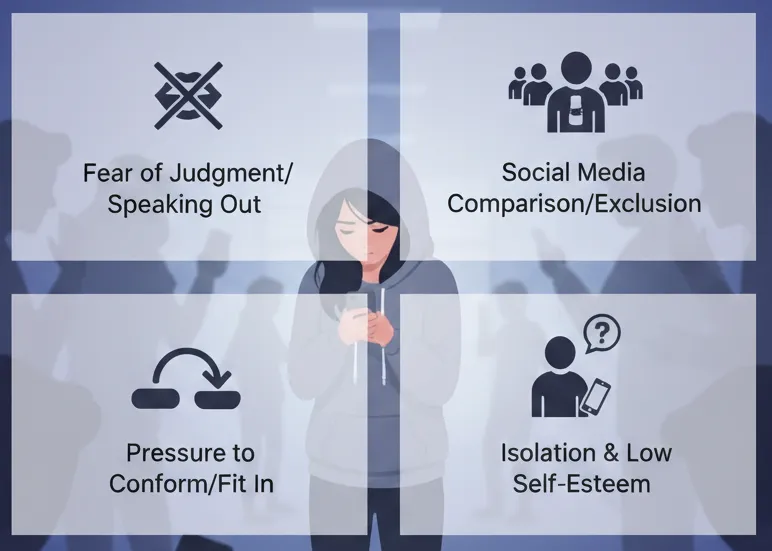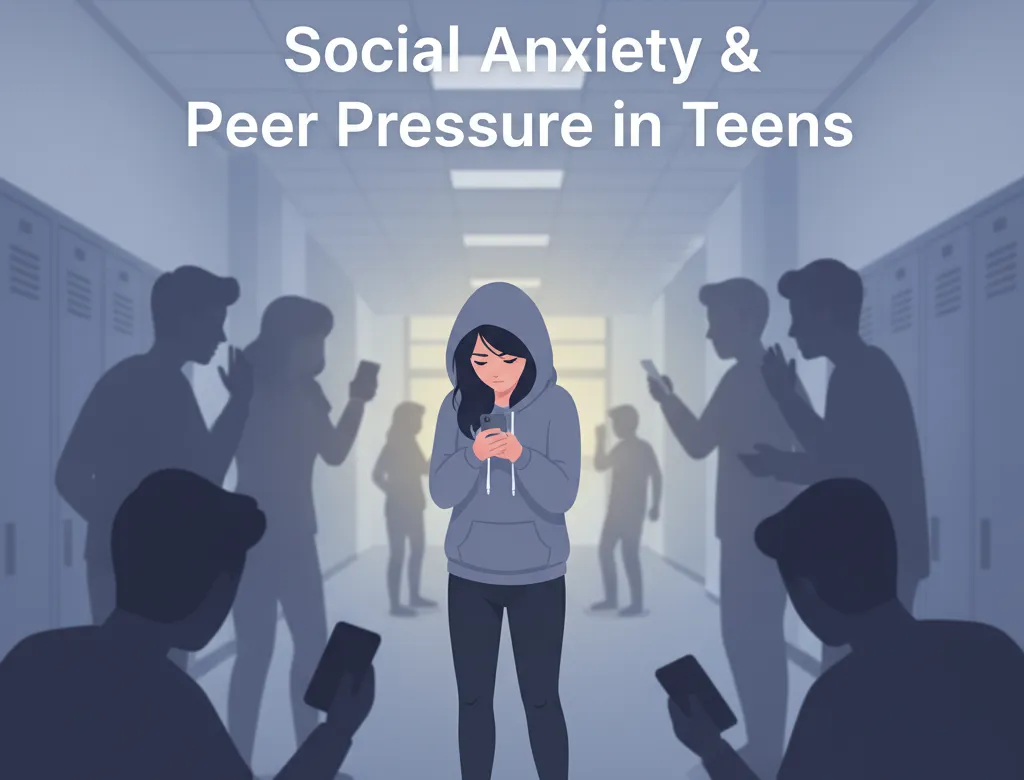Being a teenager is an exciting but challenging stage of life. It’s a time of self-discovery, new friendships, and learning independence. But it’s also a period when many young people struggle with adolescent anxiety and the strong influence of peer pressure.
For some teens, the fear of judgment and the desire to “fit in” can feel overwhelming. Understanding how social anxiety and peer pressure interact is an important step toward supporting teens and promoting healthier growing up mental health.
What is Social Anxiety in Teens?
Social anxiety is more than shyness. It’s an intense fear of being judged, embarrassed, or rejected in social situations. While everyone feels nervous sometimes, teens with social anxiety may:
Avoid speaking in class or social gatherings
Worry for days before events
Fear meeting new people or trying new activities
Experience physical symptoms like sweating, shaking, or a racing heart
Adolescent anxiety often shows up during teenage years because this is when peer approval feels most important. Social anxiety can make normal activities—like answering a question in school or hanging out with friends—feel terrifying.
What is Peer Pressure?
Peer pressure is the influence teens feel from friends, classmates, or social groups to act a certain way. It can be positive (encouraging a friend to study harder or join a sports team) but is often negative, pushing teens toward unhealthy or risky behaviors.
Common peer pressure effects include:
Trying alcohol, smoking, or drugs
Engaging in unsafe relationships
Skipping school or neglecting studies
Following trends that go against personal values
Because belonging is so important during adolescence, many teens give in to peer pressure even if it makes them uncomfortable.
How Social Anxiety and Peer Pressure Interact?
Social anxiety and peer pressure often feed into each other. A teen who fears rejection may feel extra pressure to conform, even at the expense of their well-being. For example:
A socially anxious teen may drink at a party just to avoid standing out.
They may stay silent when friends say or do things they disagree with.
They might avoid social settings altogether, missing out on healthy friendships.
This cycle not only worsens adolescent anxiety but also increases the risk of harmful peer pressure effects.

The Impact on Growing Up Mental Health:
Social anxiety combined with peer pressure can deeply affect growing up mental health. Some possible impacts include:
Low self-esteem: Constant worry about judgment makes teens doubt their worth.
Isolation: Avoiding social situations can lead to loneliness.
Academic struggles: Fear of speaking in class or group work can affect grades.
Risky behavior: Giving in to negative peer pressure may cause long-term consequences.
Depression: Ongoing anxiety and stress can sometimes lead to depressive symptoms.
Recognizing these challenges early is important to protect a teen’s mental and emotional well-being.
Coping Strategies for Teens:
The good news is that with support, teens can learn to manage social anxiety and resist negative peer pressure. Here are some practical steps:
1. Build Self-Awareness:
Help teens recognize their triggers. Do they feel anxious in large groups? Do certain peers pressure them the most? Awareness is the first step toward change.
2. Practice Confidence Skills:
Simple exercises like role-playing conversations, practicing deep breathing, or starting with small social steps can build confidence over time.
3. Encourage Healthy Friendships:
Being around supportive friends reduces the need to “fit in” at any cost. Encourage teens to seek out peers who share similar values and interests.
4. Teach Assertiveness:
Teens should learn it’s okay to say “no” or express different opinions. Assertiveness training can help them stand firm without feeling guilty.
5. Limit Social Media Pressure:
Online spaces can increase both anxiety and peer pressure. Setting healthy limits helps teens disconnect from unrealistic comparisons.
6. Seek Professional Help if Needed:
If social anxiety is severe, therapy can help. Cognitive-behavioral therapy (CBT) and group therapy are especially effective for adolescent anxiety. Family counseling can also support communication and coping at home.
The Role of Parents and Educators:
Parents, teachers, and caregivers play a big role in helping teens navigate these challenges:
Listen without judgment: Teens need a safe space to share fears
Model healthy behavior: Demonstrating self-confidence and respectful boundary setting teaches by example.
Encourage growth, not perfection: Remind teens that mistakes are part of learning.
Promote open conversations about mental health: Normalizing discussions about anxiety, stress, and peer pressure strengthens growing up mental health.
Final Thoughts:
Teen years are a delicate balance between independence and belonging. For many, adolescent anxiety and peer pressure effects can feel overwhelming, but they are not insurmountable. With awareness, coping strategies, and support, teens can learn to face social challenges with resilience.
Investing in growing up mental health not only helps teens today but also lays the foundation for confident, balanced adults in the future.
Remember: no teen should have to face these struggles alone—support, understanding, and encouragement can make all the difference.


